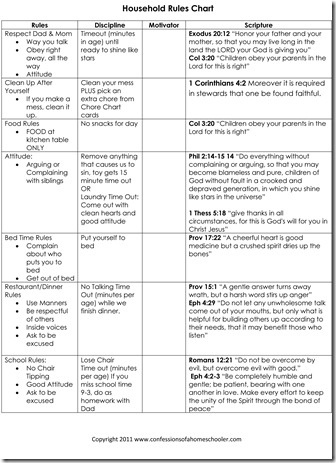Welcome to Day 3 of the Homeschool Enrichment series where we’re talking about Discipline. I realize this is a sticky topic, but you really should have a game plan, so that your emotions aren’t dictating how you will administer discipline to your children.
It is my belief that the real meat of homeschooling is the character training of our children, the academics are important and will come, but one of the huge benefits to homeschooling is that we are present for all of the discipline “opportunities” during our child’s day.
We can stop what we are doing and address their behavior on the spot. We can take a day or week off to focus on honesty, respect, compassion and the like. We can reach their hearts and change them from the inside out. Anyone can command obedience, but seeking to change your child’s heart will carry on into their adult life, the lives of their children and grandchildren after them.
Let’s take what we’ve learned on Day 2 about being a minister to our family and apply that to how we view the discipline our children. It totally changes our perspective when we realize that we are simply carrying out God’s will for His children not our own. The discipline of our children is God’s way of encouraging, motivating and steering them in the right direction. Same as He does with us.
It takes some of the pressure off of us to be what the world deems good parents. It allows us to parent and teach with intention as servants of God. Out of love for our children we faithfully follow God’s plan for their lives. One way to accomplish this task is through consistent discipline and structure in our homes.
House Rules: In order to teach with intention, we need a game plan. A set of rules that we agree to follow as a family to make our little community work. Again if we have no set goal, then not only do our kids not know what our expectations are, but neither do we.
In an attempt to retain some semblance of order and sanity in our household, my husband and I came up with a set of family rules that we follow. Once we got the rules and consequences down, my husband called a family meeting. We presented the new rules to our children along with the decided upon consequence, asked if anyone had any questions and let them know the new rules were in effect immediately.
I have to say this has been the best thing we’ve done for our family yet. First, it took all the pressure off of me to be the bad guy, after all I’m just following through with the rules. Second, it keeps me from going over board emotionally because the kids are acting up and I can’t think of a consequence for their behavior on the fly. Third, it seemed to give the kids some sense of comfort and stability knowing what our expectations of them are.
Today’s Challenge:
Sit down with your spouse (if possible) and create family rules similar to the ones below. You can also use the goals you set for your home on Day 1 of this series, to help define what is important to your family. I encourage you to keep the rules fairly simple, our family has 7 main rules. I have provided you with a sample of our family rules below so you have a starting point.
How do come up with family rules? First, sit down with your spouse (if possible) and discuss rules that you’d both like to see applied. You can use the Vision you set forth in Day 1 as a baseline to help you get started. Here’s how we organize them:
- What is the rule? ie. Respect Mom and Dad then give a couple examples of what that means like how you talk, tone of voice, obey right away all the way…etc. I included school rules in our house rules chart just to keep things simple.
- What is the discipline or consequence for breaking the rule?
- What is the “motivator” for not taking the consequence. Be clear that the motivator does not replace the consequence in step 2, and is only there if your child needs to be ‘motivated’ to accept their due consequence. Since explaining all the rules to our children I’ve found that we rarely have to resort to the motivator. In the printable below the motivator column is empty as I imagine you all have your own means of disciplining your children. We choose discipline that is appropriate for the ages of our children for example the older ones get something they desire taken away such as TV time, DS play time, Wii time etc.
- What is the supporting Scripture? As I’ve stressed in the days leading up to today, we need a reason, plan, and guidance for what we are doing. It is much easier to explain to your child why a rule is important, if you yourself know why. The supporting scripture just reminds us what God’s Word says on the topic so we can be faithful and just to carry out His commands.
I really hope you all take the time to do this, consistency in discipline is key to getting your home and homeschool in order!
Stick around tomorrow for Day 4 of Homeschooling Enrichment where we’ll be talking about teaching responsibility to our children!
Note: Some of the ideas from today came from an awesome bible study on parenting that my husband and I have just started which I’d highly recommend going through, plus it’s FREE online at “Parenting as a Ministry”.
Be sure to visit these brilliant women in this 10 days adventure between February 7th-18th! We love these ladies and we know you do too.





















another great post erica! thanks for this..
I am loving this homeschool discussion!!! Thanks so much for sharing! I'm in a moms group on my facebook and we have been talking about homeschooling vs. public. So this has been great for us!!!!! Thanks again!
Erica-I was wondering if you'd be willing to share some of your discipline consequences. I know it's kind of personal, but I feel like many of us (me!) know which rules to employ, but struggle with providing reasonable consequences. Think about it-even just some would be so helpful! Thank you.
Thank you so much for posting this! I also wanted to ask if you would mind sharing your discipline consequences?
I have to comment on your Respect rule and the "Obey right away"Part of our desire to homeschool is to raise well educated independent thinkers. Teaching my child to blindly do as I say doesn't fit into this IMO. My husband and I talked about this in legnth, and often, and we continue to feel that our children should have to right to respectfully ask a question or disagree with us at any time. As long as they are emotionally in control and bring a valid topic or concern, we will address it and discuss it and it may end up coming down to "We'll talk about it later right now I just need you to do X" but we've found that the more we allow them to have an open dialogue with us and not just blindly obey the more abstractly they're able to think on their own without being prompted. God invites us to question Him respectfully. To ask Why. I think the same should be afforded to our children. Just a different perspective.
I absolutely agree. I feel strongly that in an effort to not raise stepford children we must allow their RESPECTFUL questioning on matters. There is danger in blindly following anything in life.
Minus that small stipulation, I love this chart. I struggle with understanding the root of many “Christian” discipline techniques and really love the validity and mutual respect stressed here for adults and children. We cannot treat our children like 2nd class citizens for 18 years and then expect them to behave like confident adults magically. It is very much about applying relevant consequences in a respectful manner to our little ones whom God has given us to shepherd.
Obeying right away, all the way is something we strive for, not because we are looking for unthinking children, but because God often requires us to do things that either make no sense or we aren’t best pleased about doing. Before a child shows the ability to use self-control, they aren’t allowed to do anything but obey their parent. As they show obedience, the reason behind the rule/direction is shared. In other words, around 4, you should begin to give the reasons for the rules at an age appropriate level. Some rules won’t get an explanation for years because of their ability to understand. After they begin to be characterized by obeying (and really, we’re not talking about robots here, or 100% of the time, just mostly obedient), then they win the right to appeal. The appeal has to include information not already available and a respectful tone of voice. Mom, may I appeal? Yes. You asked me to go to bed, this show will be over in 10 minutes, may I finish watching it before I go to bed? The older the child, the more you begin to not direct everything they do. Your goal is to transfer reliance on you to reliance on God.
I love this perspective! Thank you!
Thank you!Discipline has been on our hearts lately and we've been having many discussions about how we want to implement some changes.Very timely 🙂
Oh my but I am LOVING your posts! Gaining so much structure! Thank u!
Loving this, printed, laminated and up on the fridge it goes!Thanks for sharing it with us, looking forward to more of your enrichment posts!:) Blessings, Valerie
I agree. This is so helpful. We have been struggling with some issues in our house. This post is so helpful. I used it to start a discussion with hubby. We love your ideas/organization. Lots of stuff to take away and build our own house rules. Thank you! Thank you!
Thank you so much for this post. We do something like it already, but our kids need a refresher course (so do mom and dad!). Would you mind explaining further the difference between the consequence and motivator? I'm not sure I understand when you would use each one. Thank you.